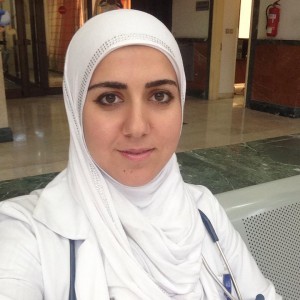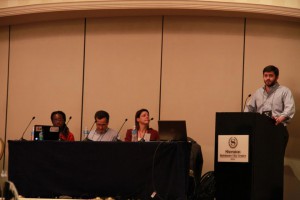
As part of Open Access Week, we’ve been asking young researchers for their points of view on open access. In this guest post, Aisha Gharaibeh, a medical student, gives us her perspective.
The concept of open access caught my eyes when I first read about it a year and a half ago. It was through the International Federation of Medical Students’ Associations (IFMSA) March Meeting 2013 in Baltimore, USA. The level of awareness among participating students was variable.
For me, I knew nothing about it, however I was eager to know more and I was fascinated by the level of awareness of some students from North America and European countries. Later on, I started working in an open access scientific journal, the International Journal of Medical Students (IJMS), through which I got introduced more to the open access concept.
Luckily, I am privileged to be a student at a university that can afford to pay thousands of dollars to make the latest publications available for free on campus. In my country, most of university students depend on their parents for studying fees and pocket money and they rarely have any other income before graduation. It would be disastrous on many levels if such subscriptions became unavailable [through universities] for the students’ and scholars’ use.
Open access seems the most efficient solution if we care enough for the future of humanity and the scientific community. Sooner or later, I will graduate as a physician and will start treating patients (like, real patients) responsibly. I take it among my responsibilities to provide my future patients with the solutions with the strongest evidence base.

Medicine is a rapidly growing field. We hear about new infectious outbreaks more frequently than we would like to admit. Many diseases that burden societies with mortality and morbidity still need a lot of research from scientists to cure them, or at least make them less devastating. If scientists get open access to research, to data and to educational resources, we can guarantee future generations many options for improving their lives.
The biggest barrier for open access is the lack of knowledge about it. It seems that decision makers in publication[s] mostly do not know much about open access and its applications and benefits for society and advancing scientific knowledge.
Many steps can be undertaken to raise awareness of open access. I would specifically focus on raising awareness in the Middle East region as raising awareness there would be a bit challenging. A special blog was started in 2010, Access to Mideast and Islamic Resources (AMIR). It contains almost all the open resources published in the Middle East and is visited by a good number of people.
The open advocates in the Middle East should plan for multiple sustainable projects. Collaboration with all the interested parties is particularly important and resources [would need to] be available in English, Arabic and Persian languages.
One Comment